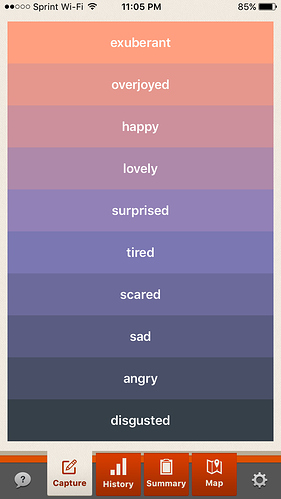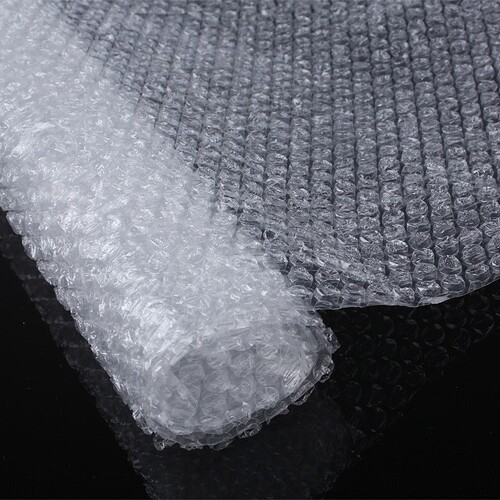Have you learned a new thing in therapy, or found a wonder herb for Depression? Thought it’d be good to share a thread for tips and thoughts related to improving and sustaining mental health.
My therapist suggested I try this app iMoodJournal. I’m really digging it. It’s moddable. You can adjust the color scheme so it represents how you perceive moods and you can adjust the main emotions to journal.
You can set reminders to pop up throughout the day to prompt you to journal. Also a good time to take a breather or meditate or walk. I modded my reminder prompt based on things I’m listening to right now. I took a screen capture so can see my reminder prompt.
When you select a mood from your base 10 it opens s journal page. On this notepad the hashtag sign opens up a long list of emotions to select from which are tracked for usage.
It tracks your emotions over time in a graph so you can see trends.
I really like this app. It’s not annoying. It has given me a lot of insight into my emotions.
I’m trying L Tryptophan as a mood stabilizer. It seems to be working so far, but it’s really too soon to tell.
I might give this a shot, it looks interesting. My experiences with therapy were malpractice-level bad, so I’m a bit loath to try again.
Hmmm, I will have to download this app.
Is what I wrote the new “I find your ideas intriguing and wish to subscribe to your newsletter”?
My treatment for SAD is an enormously powerful desk lamp and lots of vitamin D. I know this is far from being the general case, but once I had realised what the problem was this rather simple treatment alleviated it quite a lot.
It can be a part of the puzzle, even alongside other issues, of course. ![]()
Even without SAD, depression (say) reduces your activity, and in turn reduces the amount you leave the house reduced your exposure to direct sunlight, and vitamin D production, and so reduces your mood further… (Rinse and repeat)
As an aside, doctors can do a blood test for vitamin D levels.
As a second aside, vitamin D3 is the the you want - evidence is growing that the first type, D1, isn’t absorbed from tablets nearly as well as they initially thought it was. D3 is the one that helps. ![]()
(I’m sure it’s not rocket-science, working out how and why I know this. ![]() )
)
And that’s what I get.
(To be clear, I was adding to your advice with my own experience, not trying to tell you what your experience is. I suspect that wasn’t as clear as I intended. ![]() )
)
1.) Kava - Not a game changer or anything, but great for when you want to relax and generally feel that everything is right in the universe. It’s a root from the south pacific. Kava bars are cropping up all over the country. Typically they serve it in a coconut shell. They’re a great alternative to alcohol-centric nightlife. Unfortunately, the taste is not exactly great, which is why, for my own use, I buy it as an extract.
2.) Psychedelics - I haven’t tried this myself, but I have a friend who lives in a country where these things are legal, and she insists that a mild trip 2-3 times a year does more for her than any antidepressant she’s been prescribed. She says that they take her out of herself, allow her to see her own self-deceptions and selfish habits that build up in her mind like plaque, and keep her attuned to what’s important in the present moment. She recommends San Pedro cactus as a readily obtainable source of mescaline, if other substances aren’t available.
3.) Art - Art really does change your consciousness. It shifts your focus away from your stresses and anxieties (and Donald Trump) to the timeless, beautiful and transcendental. You also begin to see the world differently, as though in higher resolution:
It’s important that you not view it as something you have to spend years learning how to do before it becomes rewarding; it’s the process itself that’s rewarding, and that’s accessible to you on day one. Getting good is just the icing on the cake.
4.) Zen - The tenets of which are articulated by the incomparable Alan Watts:
5.) Change your situation - Sometimes you get so used to circumstances you hate that you stop noticing just how unhappy they’re making you; how they poison every aspect of your life. For me it was a job I hated, and the best thing I ever did for my mental health was start an at-home business that maximizes my free time.
6.) And lastly, at the risk of stating the obvious:
One dose - one solitary dose - of LSD-23 got me out of depression at university. That’s all it took. I don’t say it works for everybody and I have felt no need to repeat the experience, but it worked.
I was just confirming. I think by now you should know that I am unlikely to take anything you post the wrong way.
Well thank you. ![]() For myself, I hate to give offence to good people, so clarifying my intent is easy.
For myself, I hate to give offence to good people, so clarifying my intent is easy.
(This indirect brain-to-brain communication is hard sometimes.)
Same here. Most were awful, about one in four were okay. I’m starting a new therapist in two weeks, expecting more of the same crap.
It’s that damned ‘people’ thing again.
As everyone has different personal interaction styles, experiences and skills, some of them gel with you much better than others - and some either just aren’t a good fit with you, or, yes, like any medical professional can just be generally crap.
Some you can put up with a less-than-perfect fit with, if they actually really know their stuff and are helping, but don’t put up with anyone who isn’t actually listening.
Having said that, the crap ones tend towards going out of business over time, so here’s hoping that your next one is a good fit, and worth you. ![]()
I know this one had had a lot of negative publicity because it’s been oversold, but magnesium has worked wonders for me.
I was very easily stressed, had a hard time concentrating, partly because of insomnia. I also had a virtual addiction to foods like spinach and almonds – I would go through several cups of almonds per week. And then the muscle twitches started. Like having a twitchy eyelid, but in the larger arm and leg muscles. I could see the muscle moving on its own. It didn’t hurt but it felt uncomfortable.
And then I found out all those things are signs of magnesium deficiency.
I take 250mg morning and evening now. The difference between muscle issues and stressiness and feeling calm and spasm-free was two weeks.
Turns out spinach and almonds are both magnesium-rich foods, although I guess I wasn’t getting enough. I still like them, but I don’t have to have them all the time like I used to.
Magnesium deficiency can be caused by stress (you use up more when you’re stressed), and it takes a lot to be toxic, so it’s a reasonable thing to try and see if it works if you think it might be an issue.
Learning something new, especially something just a bit out of your comfort zone. It sounds counterintuitive, but one of the problems with depression is boredom. You can’t be bored and scared at the same time. Something interesting but just a little bit intimidating that is new and sticking with it means that your brain has less resources to spend on negative thoughts.
It’s finding something that walks the line between “I am going to figure this out, damnit!” without crossing over into rage-quit. It also helps if it’s something where you can see improvement fairly rapidly, but that takes a long time to master, because it feels good to have that aha! moment, and better if they just keep coming.
Just putting this here for portable options.
Here’s my review of over the counter Lithium. It’s not the prescription version that makes your hands shake and all that; it’s a much lower dose, different formulation that is such low amounts that it can be found in water. Interestingly, in places where it does occur in water in higher doses, suicide rates are lower.
More on this supplement - there’s not much real info; there was one clinical study where they gave it in massive doses to rats and it didn’t end well. Of course you don’t take those kinds of doses, so it’s not that useful. My doctor found this article.



